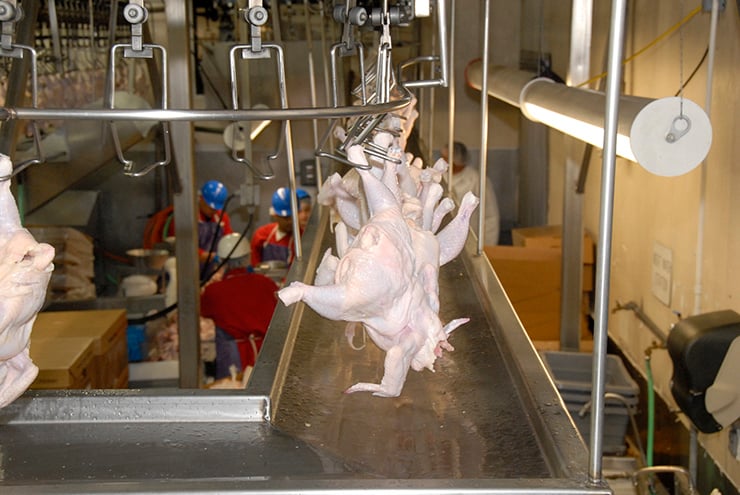Duvan Pérez immigrated to the U.S. from Guatemala a few short years ago. He wound up working at a Mississippi slaughterhouse that supplies chickens to Chik-fil-A. Last year, while cleaning the deboning area, he got his hand caught in some equipment. Pérez found himself sucked into the rotating shaft of a machine and was dead within minutes. He was 16.
Most of the coverage of this story has focused on the question of labor violations. Federal law prohibits hiring anyone under 18 to work in slaughterhouses due to the dangerous nature of the work. NBC News reported that Pérez was illegally hired through a third-party staffing agency while posing as a 32-year-old man. An attorney for the company told the outlet “they were surprised and somewhat horrified” to learn the 16-year-old wasn’t a 32-year-old. I imagine they were as “surprised” and “somewhat horrified” as my wife is whenever I find a stack of packages addressed to her on our porch.
Missing from the news coverage, however, is any acknowledgment of the role immigration has played in it. The coverage, instead, reflects a surrender on the issue of U.S. reliance on cheap “immigrant” labor—that is to say, the labor of people who illegally enter the country and who should not be working here. But work they do and often for less money than Americans. America seems more and more to resemble an economic zone—a great big shopping mall powered by sweat shops—than a nation.
Sure, people still get exercised about sweatshops abroad, filled with sweaty kids toiling in sweltering and dangerous facilities. The problem, though, is that we’ve quietly imported those, too. Citing Labor Department data, NBC News reports that the number of children working illegally in the United States has skyrocketed across all industries; having nearly doubled since 2019. There are currently over 800 active child labor investigations in 47 states across various industries.
There is a connection between the rise in domestic child labor and illegal immigration, even if the media narratives permit them to merely hint at it and tuck the evidence for it between the lines.
Much of this, down to Pérez’s brutal death, is right out of The Jungle by Upton Sinclair. That story, too, has an immigration angle. It centers on a Lithuanian man recently come with his family to Chicago and provides a fictionalized account of Packingtown, the hub of Chicago’s meatpacking industry. Sinclair spent weeks studying the plants. There he had heard tales of gruesome deaths, of men being killed by their equipment. The most infamous story, which couldn’t be verified, was one in which a worker was turned into lard:
. . . and as for the other men, who worked in tank rooms full of steam, and in some of which there were open vats near the level of the floor, their peculiar trouble was that they fell into the vats; and when they were fished out, there was never enough of them left to be worth exhibiting—sometimes they would be overlooked for days, till all but the bones of them had gone out to the world as Durham’s Pure Leaf Lard!
With these vivid accounts of hideous working conditions, Sinclair had hoped his book would help spark the flame of a socialist revolution in America. He missed. But it did trigger demands for government regulation that culminated in the first set of federal food safety laws. Sinclair famously said, “I aimed at the public’s heart, and by accident I hit it in the stomach.”
Today, however, stories about immigrant workers being chewed up by machinery are used to browbeat readers into embracing a world without borders. Indeed, on Jan. 17, the day the Occupational Safety and Health Administration blamed Pérez’s death on his employer’s disregard for safety policies, the Department of Homeland Security announced that “noncitizen” workers who complain about labor violations are eligible to receive two years of “deferred action.” That is bureaucratese for a two-year amnesty.
“Noncitizen workers should never be afraid to report exploitation in the workplace or fear retaliatory actions from an abusive employer,” said Secretary of Homeland Security Alejandro N. Mayorkas in a statement. “No employer is above the law. DHS will work with our law enforcement partners to hold those who prey on the vulnerability of migrants accountable and provide protection to those who come forward to report abuse. Combatting labor exploitation helps ensure fair wages and safe working conditions for all workers in our country.”
There is an easier way to accomplish all these goals: secure the border, crack down on employers who hire these laborers, implement deportations, and so on. But there is no will to fix the problem of illegal immigration because it is a perennial issue at the intersection of left-wing identity politics and right-wing laissez-faire capitalism.
The left gets their growing coalition of the ascendant; the right gets the cheap labor that lowers costs. The squat New York Democrat, Jerry Nadler, summarized how these interests intersect: “We need immigrants in this country. Our vegetables would rot in the ground if they weren’t being picked by many immigrants, many illegal immigrants. The fact is that the birth rate in this country is way below replacement level.”
What Nadler is describing isn’t a country, however, it’s an economic zone, now become a gigantic meatgrinder situated in North America.

Leave a Reply